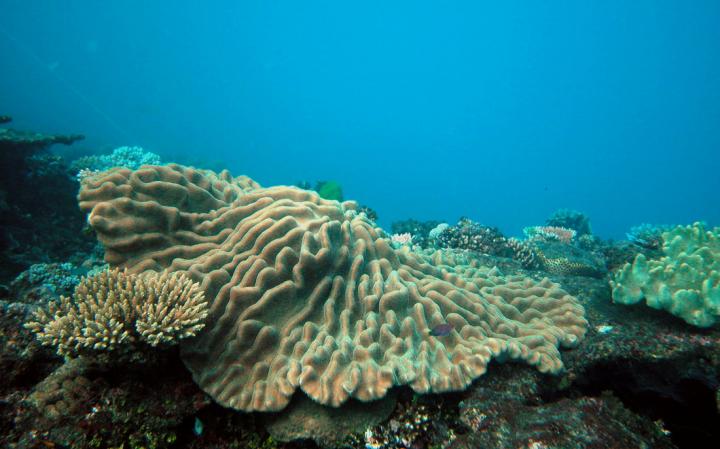When iron is limited, microalgae that live in coral cells may compensate with other metals

Credit: Todd LaJeunesse, Penn State
When iron is limited, the tiny algae that live within coral cells — which can provide the majority of a coral’s nutritional needs — change how they take in other trace metals, which could have cascading effects on vital biological functions. A new study in the journal Coral Reefs explores how different species of these microalgae rely on iron, whose already limited supply in oceans could decline with warming ocean waters, perhaps exacerbating the effects of climate change on corals.
“Iron deficiency is not just a problem for humans, but for other organisms as well,” said Hannah Reich, a graduate student in biology at Penn State at the time of the research and author of the study. “Most organisms require a certain amount of iron and other trace metals to fulfill their basic physiological needs. Because warming ocean temperatures could alter iron availability, we wanted to know how microalgae in the family Symbiodiniaceae, which commonly live within coral cells, respond to limed amounts of iron to begin to understand how they might respond to a changing climate.”
These microalgae maintain a symbiotic relationship with corals, producing energy from photosynthesis and providing up to 90 percent of the coral’s daily nutritional needs. The changing climate can affect both the coral and the microalgae, and corals under stress due to warming waters often expel their symbionts in a process known as bleaching.
The researchers found that all five species of the microalgae they investigated grow poorly in cultures when iron was absent, and four of the species grew poorly when iron was present in very low concentrations. This is unsurprising, given the essential role of trace metals in basic physiologic functions like cellular respiration and photosynthesis. The researchers suggest that the fifth species may have less stringent iron requirements, which may help explain why it persists in some corals that are bleached or diseased.
The researchers also found that, when iron was limited, the microalgae acquired other trace metals in different quantities, in a way that was unique to each species. For example, one species had much greater uptake of manganese, while another had greater copper uptake.
“We believe these differences reflect the broad physiologies and ecologies of the species we investigated,” said Todd LaJeunesse, professor of biology at Penn State and an author of the paper. “We found that species with similar ecological niches — either found in similar habitats or with shared ecological abilities — had similar metal profiles. If the microalgae are using trace metals in different amounts or in different ways, limitation of iron could have cascading effects on vital functions, like photosynthesis and whether they are able to take in other nutrients for survival.”
Because changing temperature can affect iron availability, the researchers suggest that changing availability of iron due to warming waters could exacerbate the effects of thermal stress on corals. Next, the researchers plan to investigate how iron limitation and warm temperatures combine to impact the health of these microalgae.
“Our findings provide a foundation for understanding how iron availability affects cellular processes in Symbiodiniaceae and reveal that iron limitation, through its effects on the microalgae’s growth and other trace metal usage, could exacerbate the effects of climate change on corals,” said Reich.
###
This research was made possible through the National Science Foundation East Asia and Pacific Summer Institute for U.S. Graduate Students (EAPSI) program. The program allowed Reich to travel to and work with collaborators at Academia Sinica in Taiwan, who had the necessary clean room facilities and expertise working with microalgae to reliably and accurately measure trace metals.
In addition to Reich, now a postdoctoral researcher at the University of Rhode Island, and LaJeunesse, the research team includes Irene Rodriguez at Academia Sinica, now at the University of the Philippines, and Tung-Yuan Ho at National Taiwan University. This work was funded by the National Science Foundation, the Ministry of Science and Technology of Taiwan, the NASA Pennsylvania Space Grant Consortium, and Academia Sinica.
Media Contact
Gail McCormick
[email protected]
Original Source
http://science.
Related Journal Article
http://dx.




